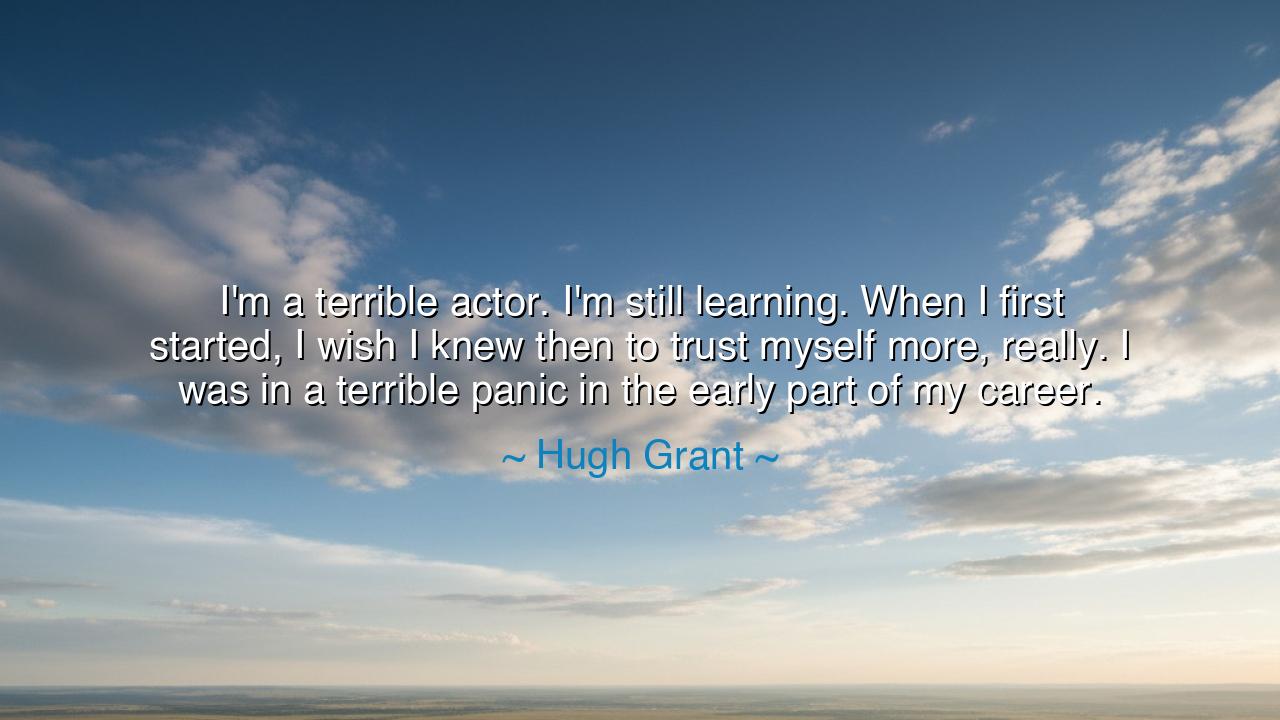
I'm a terrible actor. I'm still learning. When I first started, I
I'm a terrible actor. I'm still learning. When I first started, I wish I knew then to trust myself more, really. I was in a terrible panic in the early part of my career.






In a tone both humble and revealing, Hugh Grant once confessed, “I'm a terrible actor. I'm still learning. When I first started, I wish I knew then to trust myself more, really. I was in a terrible panic in the early part of my career.” To the untrained ear, these words might sound like self-deprecation, but to the wise, they resound as the song of a soul that has wrestled with self-doubt and emerged wiser for it. Beneath the humility of his confession lies a truth as old as art itself—that mastery is not born of certainty, but of surrender; that one’s greatest teacher is not praise or fame, but the long struggle to trust one’s own spirit.
The origin of this quote lies in Grant’s reflections upon his early years in acting, when he was still searching for his place in a craft that demands both vulnerability and courage. Before becoming known for his charm and wit in films that would define a generation of romantic comedies, Grant was consumed, by his own admission, with anxiety and perfectionism. He feared failure, he doubted his instincts, and he measured himself against others. His “terrible panic” was not the panic of incompetence, but of insecurity—the torment of one who strives so hard to please that he forgets the freedom that gives birth to truth. And thus, with age and experience, he came to understand that the greatest power in art, and in life, is the courage to trust oneself.
To the ancients, this struggle would have been recognized as a battle between fear and faith—not faith in gods or doctrines, but faith in one’s own nature. The philosopher Epictetus, himself once a slave, taught that the mind must learn to stand firm in the storm of opinion, to act not from fear of judgment, but from the calm center of integrity. In this light, Grant’s confession becomes not an admission of weakness, but a revelation of growth. To say “I am still learning” is to claim eternal youth of the spirit; to say “I wish I had trusted myself more” is to point every seeker toward the path of authenticity. For the one who learns to trust their own voice has already conquered half the world.
Grant’s words also remind us of the cruel irony of talent: that those who possess it often doubt it most. The poet John Keats once called this the “chameleon quality” of the artist—the ability to dissolve into every role, every vision, but at the cost of one’s own center. When one is always becoming someone else, the question “Who am I?” becomes a haunting refrain. The young actor, like the young scholar or craftsman, often mistakes imitation for excellence and precision for truth. But real artistry—whether in performance, writing, or life—emerges only when one dares to let go of the mask. Grant’s realization, then, is not just personal—it is universal. It is the cry of every human being who has ever sought approval before authenticity.
Consider, for example, the story of Vincent van Gogh, who spent much of his life believing himself a failure. In his letters, he often doubted his worth, lamented his lack of recognition, and questioned the value of his art. Yet in the very depths of his uncertainty, he painted with the hand of a prophet, trusting, however faintly, that the light he saw within would someday be seen by others. His genius did not come from confidence, but from persistence—the decision to keep creating even when the world did not yet understand. Like Grant, he reminds us that learning is never finished, that self-trust is not a gift we are given, but a practice we must build, day by day.
The “terrible panic” Grant describes is, in truth, the shadow that visits anyone who dares to chase excellence. It is the fear that humbles kings and cripples artists—the fear of not being enough. But fear, when faced with courage, becomes the forge of character. The actor who once panicked on stage learns to breathe. The writer who once trembled before a blank page learns to trust the rhythm of the words. The soul that once doubted its worth learns that authenticity, not perfection, is the measure of greatness. Thus, what once terrified becomes the very source of mastery.
Let this be the lesson that Grant’s confession passes down to all who strive in any craft or calling: trust yourself, even when the world gives you reason to doubt. You will falter; you will stumble; you will panic—but these are not signs of weakness, only of humanity. In every discipline, the moment of breakthrough comes not when we control, but when we release—when we allow instinct to lead and imperfection to teach. Do not wait for certainty; act in faith, and let growth follow.
So remember, children of creation: learning never ends, and mastery is born not from confidence, but from courage. As Hugh Grant reminds us, the artist who doubts himself is often the one who cares most deeply, and the one who learns to trust his own voice will speak with the strength of a thousand teachers. For in the end, the greatest performance is not on the stage, but in the heart—the quiet act of believing that who you are, unguarded and unpolished, is already enough.






AAdministratorAdministrator
Welcome, honored guests. Please leave a comment, we will respond soon